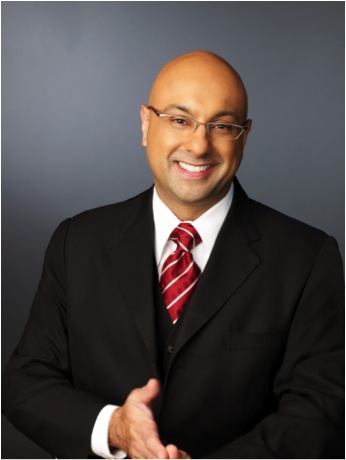
Thursdays at the Huffington Post, Rana Florida, CEO of The Creative Class Group, will answer readers' questions about how they can optimize their lives. She will feature conversations with successful entrepreneurs and thought leaders about how they manage their businesses, relationships, their careers, and more. Send your questions about work, life, or relationships to rana@creativeclass.com.
We are all feeling strained from the economic crisis. So this week I bring you a conversation with CNN anchor and chief business correspondent Ali Velshi, on how to start making money. Ali offers great advice on school, work, and how to ask for a raise. Most importantly, Ali teaches us to take life as an adventure.

Photo Courtesy: CNN
Q. Your latest book, How To Speak Money: The Language and Knowledge You Need Now, shows readers how to start making money. PLEASE, tell us how!
A. Think about money more broadly than you do now. The trend over the last year is to think about your financial situation relative to others. Think about whether you are earning, saving, or investing to your potential. If not, think about the best ways to increase your earning potential. Is it actively working towards a promotion at work? Retraining from a dying industry into a growing one? Investing more aggressively or starting the small business you have always dreamed of? Uncertain economies present excellent opportunities.
Q. What advice would you give to a student debating whether they should go directly into the workforce or continuing on to graduate school?
A. Hands-down I would choose further education, but be smart. If you have an undergraduate liberal arts education, consider augmenting it with a professional degree that is more likely to increase your earning potential (the highest paid English majors who work within their field of study are technical writers). Engineers, accountants, and health-care workers all benefit financially from further education. But your increased earning potential tends to flatten out once you have a masters degree.
Q. How does a 60-year-old who's lost his or her pension in the crisis go back into the workforce and compete with the younger generation?
A. By choosing to do something that won't penalize them for being 60. Several companies (the AARP keeps a list) actively encourage older Americans to join them; they like the lifetime of experience and responsibility that seniors bring. Work part-time or even consult in the field you've spent your career in. I've also heard from several people say that volunteering has helped them create a network that led them to paid post-retirement work.
Q. In today's climate, what's a better bet, getting a stable job and climbing the corporate ladder or venturing out solo?
A. This entirely depends on your comfort level. If you're young, the experience of working under someone else will help immeasurably when you decide to start out on your own. But in a weak (yet strengthening) job market, the downside of starting out on your own is smaller. Stay open to either possibility.
Q. Would you be as successful if you were just out of college and looking for your first job now?
A. If I were just out of college today I'd turn around and go right back and get a degree that's a little more relevant than the one I got in religion. Plus I'd learn Mandarin. Times are different; while I'd be the same person with the same drive, a liberal arts bachelor's degree doesn't even get you in the door sometimes. This is a global, technological world. If you don't want to be global or technological, you'd better be damned good at whatever it is you do.
Q. Several young people have written in saying they deserve a raise but given today's economic climate they're afraid to ask. They feel fortunate to have a job and don't want to "rock the boat." What do you think is the best way to ask for a raise when millions of people are out of work?
A. Have a very specific reason for asking for it. Think of it as a deal with your employer: "I did this for you; how do you feel about giving me a little extra?" Consider taking a position with greater responsibility without the pay increase, with the agreement that if you perform beyond expectations, you'll get the financial reward. The worst thing I have seen is people who turn down more responsibility because it doesn't come with a raise. That's plain stupid.
Q. Most people feel housing and stocks are still risky. What's the best way to start saving money?
A. Any investment needs to fit you more than you need to fit it. Rather than think of investments discretely, understand what you have the tolerance for. You do that by taking a risk tolerance quiz. Matching your investments to your risk tolerance actually has a greater effect over time than the investments you choose, because if you invest according to your temperament, you are less likely to make bad decisions in tough times. For most people, investing through mutual funds (in specialized areas) or ETFs (Exchange Traded Funds -- baskets of stocks that you buy and sell like an individual stock) are better than investing in specific stocks or even sectors. And remember, if you own a house, you don't want to be over-exposed to the housing sector by being too heavily invested in real estate in your portfolio.
Q. Given the volatility of the housing market, would you advise a young family to buy a house now?
A. Do you have good credit, allowing you to get a 30-year mortgage at five per cent or less? Do you have 20 per cent or more for a down payment? Do you have job stability, so that you're not likely to need to move anytime soon because you or your spouse has lost a job? Are you planning to buy into a good school district? Are you likely to stay in the house long enough to weather ups and downs in the market? If so, by all means. This may be the best time in history to buy. If not, rent.

Q. What personality traits and skills are needed to be a successful leader?
A. Discipline, perseverance. and flexibility. Lots of people can excel in good times and with the right team and resources. Can you stick it out in tough times with an imperfect team and not enough money? Leaders improvise and do it with joy, not resignation, at home and at work.
Q. Did you have a career path for your life? How did you get to where you are today?
A. n hindsight, it seems like it was on a wing and a prayer. I virtually never got anything done on time as a student; now my life is all deadlines! My life has been full of those proverbial "left turns" where the outcome is never obvious. But I approached everything I've ever done as an adventure, as if someone, someday, might ask me about it. What ended up happening is I stopped pretending it was an adventure and it actually became one. And I stopped worrying about where it would all end. I couldn't have planned it better.